Yates Account
Join now
Create a Yates account today!
Sign up to join the Yates Garden Club for monthly e-mails packed with seasonal inspiration, tips for success & exclusive promotions.
Plus if you’re a Garden Club member you can take part in the Yates Growing Community - a blog to share successes, get advice & win prizes in fun challenges along the way!

Forgot password
Enter the email address associated with your account, and we'll email you a new password.

National Gardening Week 2022: 17 - 24 October 2022
'Grow Good Soil'
Nourish the soil and the soil will nourish you. Healthy soil is at the very foundation of gardening success – and life itself - and this National Gardening Week Yates wants to help you grow good soil.
Soil Your Undies!
Building healthy soil is as simple as soiling your undies. This National Gardening Week plant a pair of undies to find out how healthy your soil is. Burying 100% cotton underwear for a couple of months is an easy and effective way of measuring soil health. The more threadbare the undies, the more micro-organisms in the soil meaning the healthier the soil.
The call is out for Kiwis to soil their undies and be in to win this National Gardening Week. The process is simple:
- Plant a pair of new, cotton underwear horizontally about 3 inches deep in the site you're curious about and mark the spot.
- Wait at least 60 days. This gives your soil microbes time to work their magic! Then dig the undies back up.
- Send in a photo of your ‘harvest’ including up to 25 words on your best tip to improve soil, with name, address and phone number to [email protected] between 11th and 18th October and be in to win one of 3 Yates Grow Great Soil prize sets (see picture below). There are 3 categories of prizes: “the most soiled undies”, “the biggest undies” and “the oddest undies”. Please nominate which category you would like to enter. Plus the first 2000 entries receive a free packet of Yates vegie seeds.
- See T&Cs and Privacy Policy for full promotion details.
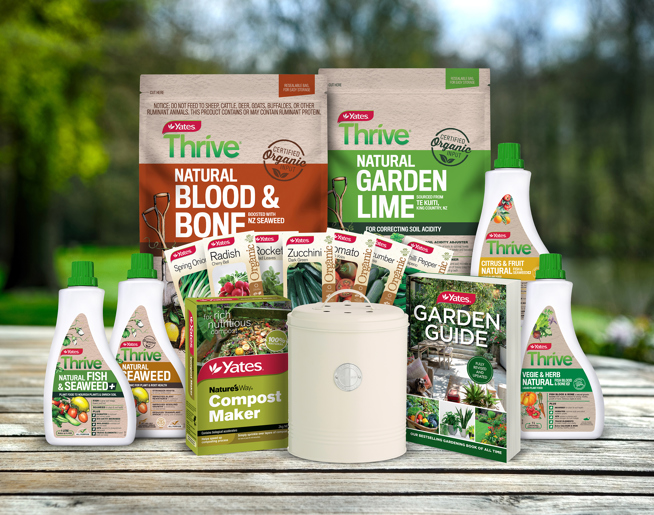
Soiling your undies is a fun way to make sure you’ve got the best soil for optimum growing conditions this spring and summer.
Creating healthy soil is as easy as feeding your soil with organic matter such as composted food scraps, grass clippings, leaves, sheep or horse poo and seaweed. Then add blood and bone to fertilise, improve soil structure and provide natural organic nutrients and lime encourages decomposition of organic matter and earthworm activity.
You’ll not only have great growing conditions for your plants but you’ll be helping nature and reducing your carbon footprint as healthy soil banks carbon.
National Gardening Week aims to foster a love of gardening with a focus on growing not only plants but friendships, good health, strong communities and closer connections with nature. Whether it’s a few pots on the balcony, a small patch or an extensive garden, everyone can experience the joy of gardening.
How to Soil your undies
The quick and dirty way to check your soil health is:

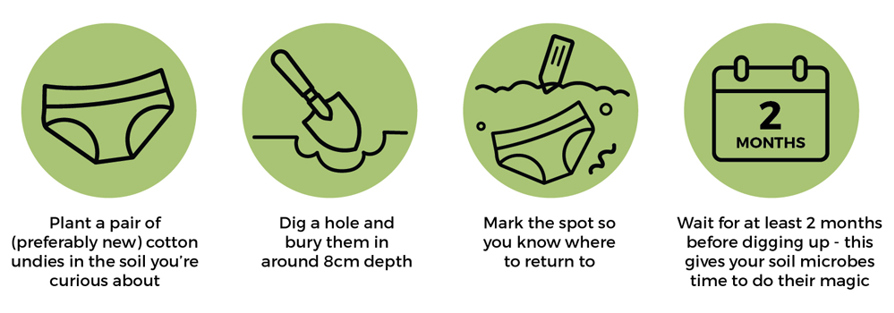
How to make your own Compost!
Making your own compost is a lot easier than you may think! With a simple compost heap you can recycle most of your organic household and garden waste and in turn enrich your garden’s soil at the same time. It’s also an extremely satisfying way to help the environment. Follow our article here about making your own Compost at home!
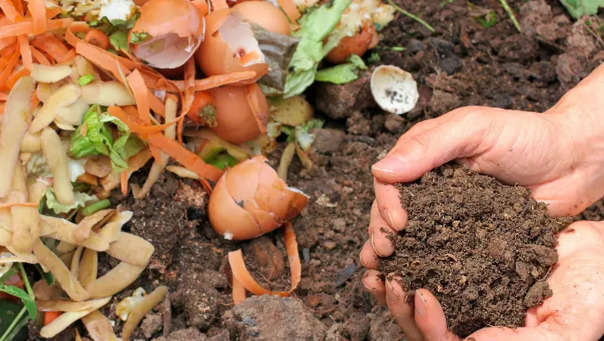
List of Organisations and Programmes that support healthy soil:
The following organisations and programmes teach, support or encourage people to grow healthy soil:
Share Waste - We connect people who wish to recycle their food scraps and other organics with their neighbours who are already composting, worm-farming or keep farm animals. Now you can divert organic material from landfill while getting to know the people around you!
EcoMatters - an established charitable trust that works with and for the community to deliver environmental initiatives in partnership with key entities like Auckland Council, the Ministry for the Environment, other not-for-profits and community groups. Programmes and workshops include restore nature, grow food, reduce waste, ride and fix bikes, and live more sustainably.
The Compost Collective - Learn how to make your own composting system, how to compost dog poo, what you need to start your own composting hub, and lots more.
Love Food Hate Waste - The average Kiwi family throws away three shopping trolleys of edible food each year. Find lots of tips on how to reduce your food waste and compost food scraps to keep them out of landfill.
Soil & Health Association - champions society’s collective responsibility to protect the health of our soils for future generations.
Soil Matters - Soil Matters is an established soil consultancy company based in Christchurch, dedicated to the health of NZ soil and providing expertise and personal guidance to make the most of your farming operation.
Sustainability Trust – How to make your own compost and start a worm farm.
Wastebusters – how to hot compost.
Auckland Council – tips for composting at home
Christchurch City Council – five easy steps to composting
Wellington City Council – reduce your waste and learn about composting
Lynda Hallinan – how to compost like a pro – 10 tips for success.
Predator Free – how to keep your compost rodent free.
Dr Compost – Dr Compost is a home-composting programme funded by Queenstown Lakes District Council and delivered by Wastebusters to reduce organic waste in landfill. If you are a Queenstown Lakes resident, Dr Compost can help you get composting through one-on-one advice, group workshops and articles. Sort out your composting dilemmas and turn your organic waste into black gold for your garden.
How to make a Compost jar!
Without soil there would be no life. Soil is at the root of not only a healthy vegie garden but a healthy planet. A vital part of growing good soil is producing compost which will provide lots of nourishment for your plants – and it’s easy to do.
Try this recipe for Compost in a jar and watch nature at work breaking down the leaves, grass clippings, food scraps and newspapers into a nutritious soil to feed your vegies, flowers and trees. The tiny microbes, insects and worms help them decompose
You can then do this on a bigger scale in your garden.
You will need:
- A medium to large jar e.g. a reserving jar
- Soil
- Old paper (like newspaper)
- Water (about 1 cup)
- A mixture of green and brown materials
- Brown materials include straw, paper, dry leaves, wood cuttings, sawdust etc.
- Green materials include fruit and vegetables scraps, used tea, coffee grounds, crushed egg shells, grass clippings, green plant cuttings, old flowers and weeds.
What to do:
- Put a handful of soil in the jar
- Add some torn up strips of newspaper, kitchen fruit and vegie scraps, leaves and grass clippings in layers until the jar is nearly full
- Add in rainwater to provide some moisture – but not too much
- Put a lid on it with holes for oxygen
- Put on a sunny windowsill
- Check every two weeks and see what is happening in the soil.
For more tips on increasing your organic gardening follow this guide.

Fun for kids!
Check out this great little project booklet for kids - including how to build a worm jar!
Sign up to join the Yates Garden Club and like us on Facebook to be kept in the loop on promotions and get inspiration over National Gardening Week!
How to do a worm count
Worms thrive on organic matter in soil – leaves, garden waste, food scraps, mulch and compost – so feed your soil organic matter.
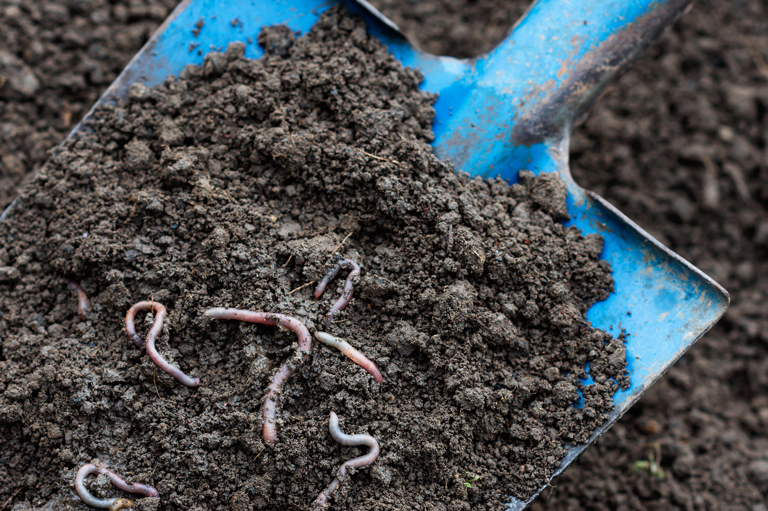
Worms decompose plant and root litter and also feed on beneficial bacteria and fungi in your soil. The presence of worms can tell you a lot about your garden. It will tell you if you have enough organic matter in your soil and how healthy your soil is. The more worms in your soil the healthier the soil.
To do a worm count all you need is:
- shovel
- tarp
- ruler
- small container
- Choose a day when the soil is moist. Overly dry soil will cause worms to migrate away and not give you an accurate count.
- Use your ruler to measure a 30cm x 30cm square in a portion of your garden that you want to assess.
- Scoot aside any mulch from the top and dig out the soil from the 30cm x30cm square. Dig down to a depth of 30cm to give yourself a cubic metre of soil. Place the soil on the tarp.
- Work your way through the soil and when you find a worm place it in your container. Break up clods of earth as there may be worms in there and look for evidence of worms such as worm tracks and burrows and worm cocoons. A worm cocoon holds the egg(s) from which a young earthworm develops. They are oval or tear-drop shaped and are the size of a grain of rice and range in colour from yellow to red.
- Empty your container of worms onto your tarp and include any worm cocoons that you found and get counting.
>30 worms You have very fertile garden soil
15 worms The average for most soils
<5 Your soil needs more organic matter like compost
Types of worms:
There are a lot of different worms which occupy different areas of the soil. Find out where to find different earthworm species in New Zealand: https://www.sciencelearn.org.nz/image_maps/71-common-new-zealand-earthworms
Food Waste Audit
Try using this simple chart to measure how much food you waste at your place, you might be surprised at the results!
Tips to reduce food waste:
- Buy less food
- Buy less of the food that goes to waste the most
- Plan meals in advance
- Cook smaller portions
- Cook food that people want to eat
- Snack on perishable food first, such as fresh fruit and vegetables
- Get creative with leftovers
- Store food properly as soon as you bring it home
- Use vegetable scraps and bones for broth
- Learn how to preserve food
- Compost what goes to waste








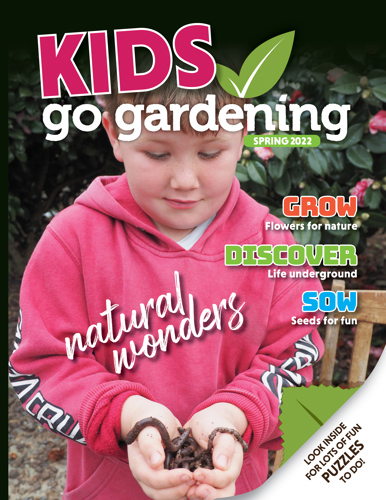
Share
Share this article on social media